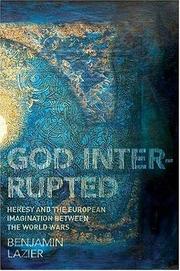| Listing 1 - 3 of 3 |
Sort by
|

ISBN: 1400837650 128296478X 9786612964787 9781400837656 9780691136707 069113670X 6612964782 0691155410 9781282964785 9780691155418 Year: 2010 Publisher: Princeton, NJ
Abstract | Keywords | Export | Availability | Bookmark
 Loading...
Loading...Choose an application
- Reference Manager
- EndNote
- RefWorks (Direct export to RefWorks)
Could the best thing about religion be the heresies it spawns? Leading intellectuals in interwar Europe thought so. They believed that they lived in a world made derelict by God's absence and the interruption of his call. In response, they helped resurrect gnosticism and pantheism, the two most potent challenges to the monotheistic tradition. In God Interrupted, Benjamin Lazier tracks the ensuing debates about the divine across confessions and disciplines. He also traces the surprising afterlives of these debates in postwar arguments about the environment, neoconservative politics, and heretical forms of Jewish identity. In lively, elegant prose, the book reorients the intellectual history of the era. God Interrupted also provides novel accounts of three German-Jewish thinkers whose ideas, seminal to fields typically regarded as wildly unrelated, had common origins in debates about heresy between the wars. Hans Jonas developed a philosophy of biology that inspired European Greens and bioethicists the world over. Leo Strauss became one of the most important and controversial political theorists of the twentieth century. Gershom Scholem, the eminent scholar of religion, radically recast what it means to be a Jew. Together they help us see how talk about God was adapted for talk about nature, politics, technology, and art. They alert us to the abiding salience of the divine to Europeans between the wars and beyond--even among those for whom God was long missing or dead.
Gnosticism --- Pantheism --- Heresy --- Jewish philosophy --- God (Judaism) --- Cults --- Philosophy --- Religion --- Panentheism --- Heresies --- Offenses against religion --- Apostasy --- Judaism --- History --- History of doctrines --- Strauss, Leo. --- Scholem, Gershom, --- Jonas, Hans, --- Europe --- Intellectual life --- Scholem, Gershom Gerhard, --- Jews --- Philosophy, Jewish --- Philosophy, Israeli --- Shalom, Gershom, --- Sholem, Gershom, --- שלום, גרשם --- שלום, גרשם, --- שלום, גרשום --- גרשם, שלום --- Jonas, Hans, - 1903-1993. --- Scholem, Gershom Gerhard, - 1897-1982.
Book
ISBN: 082297813X 9780822978138 9780822962205 0822962209 Year: 2012 Publisher: Pittsburgh, Pa. University of Pittsburgh Press
Abstract | Keywords | Export | Availability | Bookmark
Book

ISBN: 1280597747 9786613627575 3110247755 9783110247756 3110247747 9783110247749 9783110247749 9781280597749 6613627577 Year: 2012 Volume: 60 Publisher: Berlin Boston
Abstract | Keywords | Export | Availability | Bookmark
 Loading...
Loading...Choose an application
- Reference Manager
- EndNote
- RefWorks (Direct export to RefWorks)
Since the Enlightenment period, German-Jewish intellectuals have been prominent voices in the multi-facetted discourse on the reinterpretation of Jewish tradition in light of modern thinking. Paul Mendes-Flohr, one of the towering figures of current scholarship on German-Jewish intellectual history, has made invaluable contributions to a better understanding of the religious, cultural and political dimensions of these thinkers' encounter with German and European culture, including the tension between their loyalty to Judaism and the often competing claims of non-Jewish society and culture. This volume assembles essays by internationally acknowledged scholars in the field who intend to honor Mendes-Flohr's work by portraying the abundance of religious, philosophical, aesthetical and political aspects dominating the thinking of those famous thinkers populating German Jewry's rich and complex intellectual world in the modern period. It also provides a fresh theoretical outlook on trends in Jewish intellectual history, raising new questions concerning the dialectics of assimilation. In addition to that, the volume sheds light on thinkers and debates that hitherto have not been accorded full scholarly attention.
Jewish philosophy --- Judaism and philosophy. --- Judaism --- Jews --- Religions --- Semites --- Philosophy and Judaism --- Philosophy --- Philosophy, Jewish --- Philosophy, Israeli --- History. --- Religion --- Judaism and philosophy --- History --- Jewish philosophy - Germany --- Judaism - Germany - History --- German-Jewish History. --- Jewish Intellectual History. --- Jewish Philosophy. --- Modern Judaism. --- Religious Philosophy.
| Listing 1 - 3 of 3 |
Sort by
|

 Search
Search Feedback
Feedback About UniCat
About UniCat  Help
Help News
News